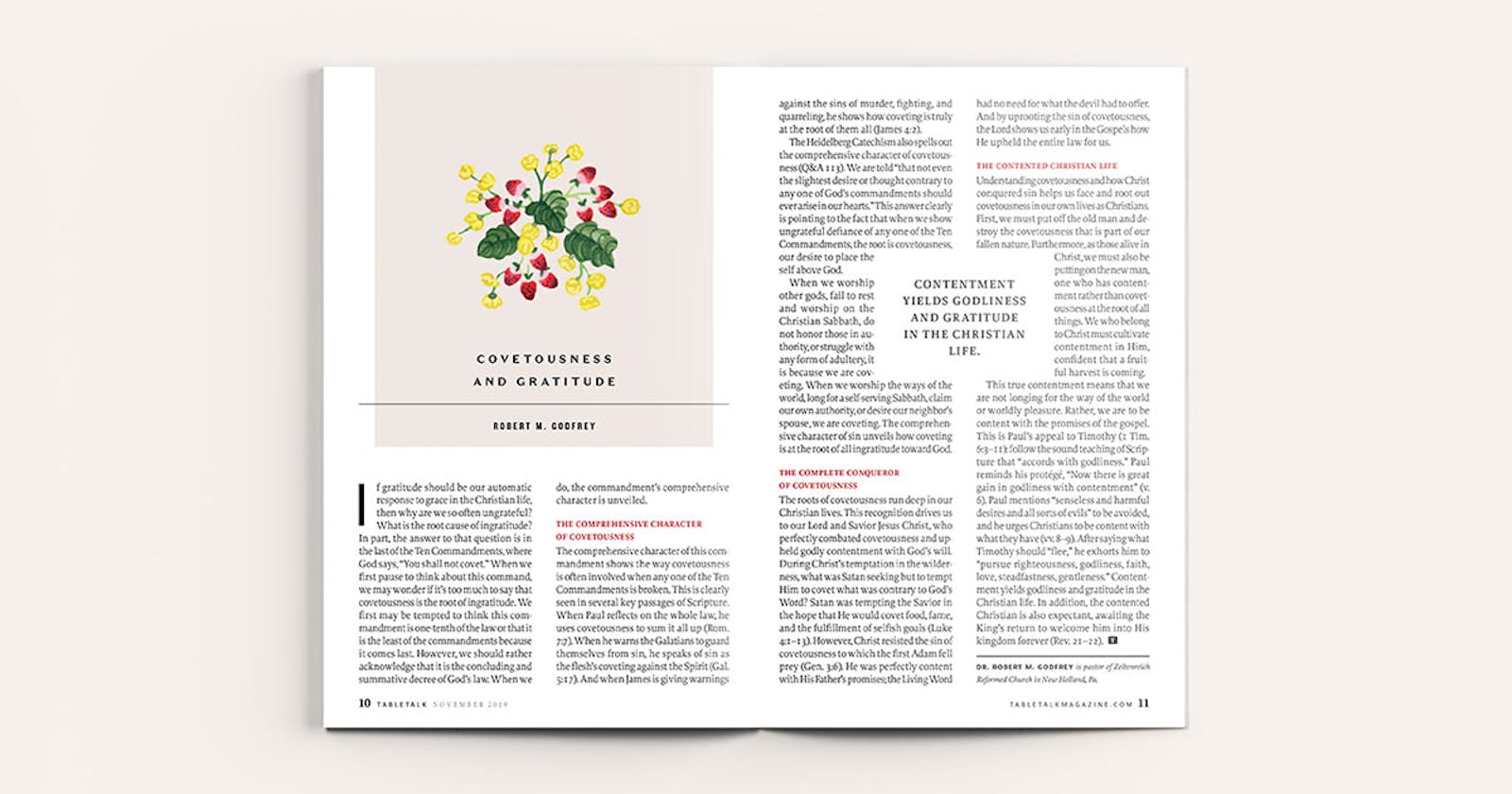
Request your free, three-month trial to Tabletalk magazine. You’ll receive the print issue monthly and gain immediate digital access to decades of archives. This trial is risk-free. No credit card required.
Try Tabletalk NowAlready receive Tabletalk magazine every month?
Verify your email address to gain unlimited access.
If gratitude should be our automatic response to grace in the Christian life, then why are we so often ungrateful? What is the root cause of ingratitude? In part, the answer to that question is in the last of the Ten Commandments, where God says, “You shall not covet.” When we first pause to think about this command, we may wonder if it’s too much to say that covetousness is the root of ingratitude. We first may be tempted to think this commandment is one-tenth of the law or that it is the least of the commandments because it comes last. However, we should rather acknowledge that it is the concluding and summative decree of God’s law. When we do, the commandment’s comprehensive character is unveiled.
The Comprehensive Character of Covetousness
The comprehensive character of this commandment shows the way covetousness is often involved when any one of the Ten Commandments is broken. This is clearly seen in several key passages of Scripture. When Paul reflects on the whole law, he uses covetousness to sum it all up (Rom. 7:7). When he warns the Galatians to guard themselves from sin, he speaks of sin as the flesh’s coveting against the Spirit (Gal. 5:17). And when James is giving warnings against the sins of murder, fighting, and quarreling, he shows how coveting is truly at the root of them all (James 4:2).
The Heidelberg Catechism also spells out the comprehensive character of covetousness (Q&A 113). We are told “that not even the slightest desire or thought contrary to any one of God’s commandments should ever arise in our hearts.” This answer clearly is pointing to the fact that when we show ungrateful defiance of any one of the Ten Commandments, the root is covetousness, our desire to place the self above God.
When we worship other gods, fail to rest and worship on the Christian Sabbath, do not honor those in authority, or struggle with any form of adultery, it is because we are coveting. When we worship the ways of the world, long for a self-serving Sabbath, claim our own authority, or desire our neighbor’s spouse, we are coveting. The comprehensive character of sin unveils how coveting is at the root of all ingratitude toward God.
The Complete Conqueror of Covetousness
The roots of covetousness run deep in our Christian lives. This recognition drives us to our Lord and Savior Jesus Christ, who perfectly combated covetousness and upheld godly contentment with God’s will. During Christ’s temptation in the wilderness, what was Satan seeking but to tempt Him to covet what was contrary to God’s Word? Satan was tempting the Savior in the hope that He would covet food, fame, and the fulfillment of selfish goals (Luke 4:1–13). However, Christ resisted the sin of covetousness to which the first Adam fell prey (Gen. 3:6). He was perfectly content with His Father’s promises; the Living Word had no need for what the devil had to offer. And by uprooting the sin of covetousness, the Lord shows us early in the Gospels how He upheld the entire law for us.

The Contented Christian Life
Understanding covetousness and how Christ conquered sin helps us face and root out covetousness in our own lives as Christians. First, we must put off the old man and destroy the covetousness that is part of our fallen nature. Furthermore, as those alive in Christ, we must also be putting on the new man, one who has contentment rather than covetousness at the root of all things. We who belong to Christ must cultivate contentment in Him, confident that a fruitful harvest is coming.
This true contentment means that we are not longing for the way of the world or worldly pleasure. Rather, we are to be content with the promises of the gospel. This is Paul’s appeal to Timothy (1 Tim. 6:3–11): follow the sound teaching of Scripture that “accords with godliness.” Paul reminds his protégé, “Now there is great gain in godliness with contentment” (v. 6). Paul mentions “senseless and harmful desires and all sorts of evils” to be avoided, and he urges Christians to be content with what they have (vv. 8–9). After saying what Timothy should “flee,” he exhorts him to “pursue righteousness, godliness, faith, love, steadfastness, gentleness.” Contentment yields godliness and gratitude in the Christian life. In addition, the contented Christian is also expectant, awaiting the King’s return to welcome him into His kingdom forever (Rev. 21–22).
